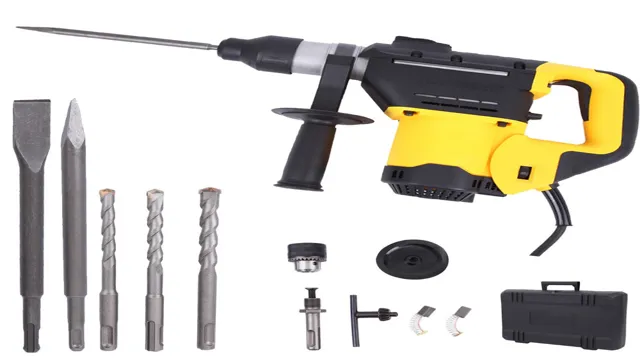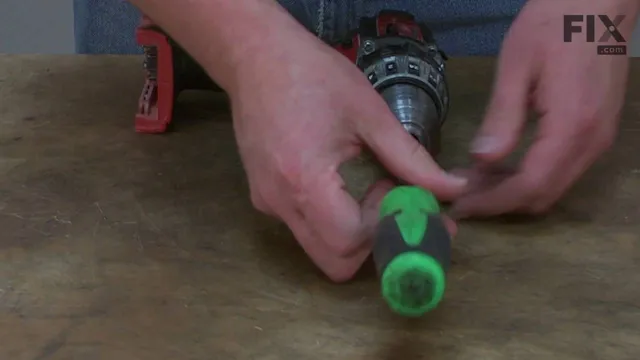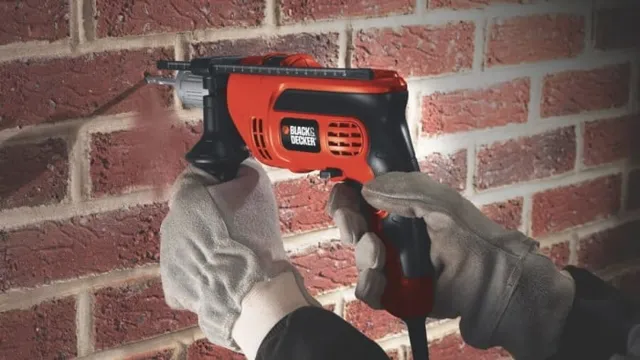Do You Need a Hammer Drill for Concrete? Tips and Recommendations.
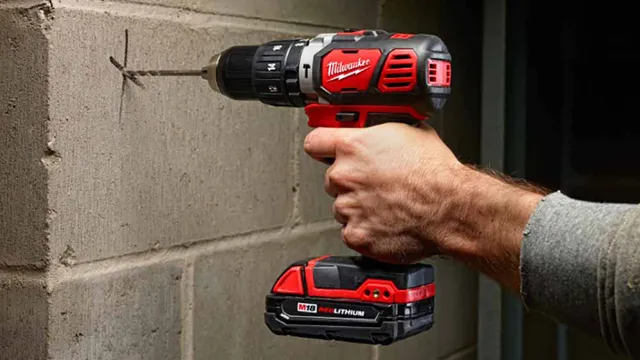
Are you dealing with a concrete project that needs a reliable power tool to help you drill? Well, look no further as we present to you the ultimate solution – hammer drills! Designed specifically for drilling through tough surfaces such as concrete, a hammer drill is a powerful tool that can make light work of any masonry job. In this comprehensive guide, we will take you through everything you need to know about hammer drills for concrete. From its definition, types, and the factors to consider when choosing one, to tips on how to drill efficiently and safely, this guide has got you covered.
We understand the importance of having the right equipment for a task, and that’s why we’ve taken the time to compile this guide. Whether you’re a beginner or a seasoned pro, there’s always something new to learn about this versatile tool. So, get ready to break through those hard concrete surfaces with ease! In the next sections, we will delve deeper into everything you need to know about hammer drills for concrete.
Introduction: Purpose of Hammer Drill for Concrete
Do you need a hammer drill for concrete projects? The answer is yes. Hammers drills are specially designed for drilling into hard materials like concrete and masonry. Their hammering action allows them to break up the dense surface of the concrete, making it easier to drill through.
The use of a regular drill on concrete could lead to damage in the tool or an unsatisfactory result in the work. Hammer drills are also versatile tools that can be used for a variety of other tasks, including drilling into wood, metal, and even tile. So, investing in a hammer drill not only ensures that you have the right tool for the job, but it can also save you time and money in the long run by being able to tackle different tasks with one tool.
What is a Hammer Drill?
A hammer drill is a powerful tool used for breaking through tough surfaces such as concrete, masonry, and stone. It was designed specifically for workers who need to make holes with a large diameter but who also require the drill to go deep down into solid surfaces. This tool features a hammering function, which has a unique impact mechanism that delivers a quick pulsing action.
This action allows the drill bit to break through the toughest material efficiently. Hammer drills are commonly used in construction sites, especially for drilling into concrete. The main purpose of a hammer drill is to make the job easier, faster, and ultimately, more effective.
By using a hammer drill, workers can complete their tasks quickly and efficiently, saving both time and money.
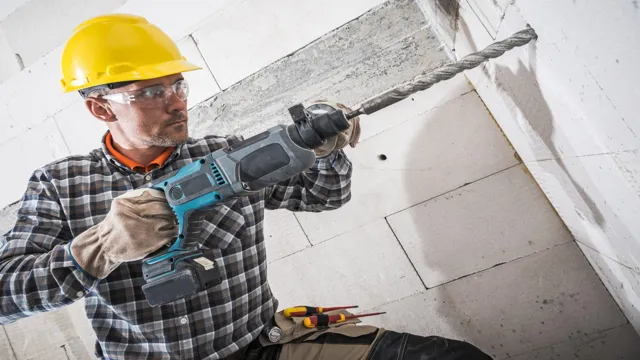
What Makes a Hammer Drill Different from a Regular Drill?
A hammer drill is a specialized tool designed to tackle drilling tasks in concrete and masonry. The hammer drill operates differently from a regular drill because it delivers a hammering action as well as rotation. This hammering motion allows the drill bit to penetrate concrete effectively as it breaks up the material; a regular drill cannot accomplish this.
The hammer drill boasts a unique clutch system that hammers the bit down while spinning it simultaneously. The force of the hammer action usually can be adjusted to give power to the drill bit for denser concrete like stone or brick. In contrast, when drilling softer materials, the hammer action can be dialed down or turned off altogether.
With a hammer drill, you can quickly and more efficiently make holes in concrete for hanging pictures, installing shelves, or enhancing outdoor spaces. However, it is essential to ensure that you have the right drill bit to match the drilling task, as hammer drills are not suitable for use with regular drill bits.
Why Use a Hammer Drill for Concrete?
If you’ve ever needed to drill or make holes in concrete, you know how difficult and time-consuming it can be. That’s where a hammer drill comes in, specifically designed for concrete drilling. The purpose of a hammer drill is to create a powerful, back-and-forth motion that chips away at the concrete as it drills, making the process smoother and faster.
The main advantage of using a hammer drill for concrete is its effectiveness in drilling through tough materials such as stone, brick, and concrete, without causing damage to the drill bit. Additionally, a hammer drill saves time and effort compared to traditional drilling methods. It’s the ideal tool for anyone in need of precision drilling in concrete applications, from home DIY enthusiasts to professional contractors.
By using a hammer drill, you can ensure a quicker and more efficient drilling process, making it the go-to tool for all concrete drilling tasks. So, if you’re looking to make drilling concrete an easier and more efficient task, a hammer drill is the right tool for you.
Choosing the Right Hammer Drill for Concrete
If you have any drilling work to be done on concrete surfaces, you must use a hammer drill. A hammer drill is a highly specialized power tool that is designed to drill through tough materials like concrete, brick, and stone. Unlike standard drills, hammer drills have a specialized mechanism that provides the hammering action necessary to penetrate hard surfaces.
Depending on the size and depth of the hole you need to drill, you’ll want to choose the right type of hammer drill. Some of the most popular models include corded vs cordless, SDS-Plus vs SDS-Max, and single vs. multi-mode.
Do you need a hammer drill for concrete? Yes, a hammer drill is essential if you want to get the job done efficiently. By using a hammer drill, you can effortlessly drill through concrete surfaces without damaging your hardware. Remember, it’s always better to use the right tool for the job to avoid unnecessary stress and frustration.
So, choose the right hammer drill based on the size, depth, and density of the surface you are dealing with.
Considerations When Choosing a Hammer Drill for Concrete
When it comes to drilling through concrete, you need a solid hammer drill that will get the job done efficiently. There are many factors to consider when choosing a hammer drill for concrete, such as power, speed, and durability. One of the most important aspects to evaluate is the drill’s impact energy, which measures how much force the tool generates with every blow.
A higher impact energy typically means better drilling performance, but it also means a heavier and more expensive tool. Another consideration is the drill’s ergonomics, as you’ll want a tool that is comfortable to hold and doesn’t cause too much strain on your hands and wrists. Additionally, it’s important to choose a hammer drill with the right max bit capacity for the specific job you’re tackling.
Overall, taking the time to research and choose the right hammer drill for your concrete projects can save you time, money, and frustration in the long run.
Types of Hammer Drills for Concrete
When you’re working with concrete, having the right tools is essential. Hammer drills are a popular choice for drilling through concrete because they have a hammering action that breaks up the concrete as the bit turns. But, not all hammer drills are created equal, so it’s essential to choose the right one for your job.
There are two main types of hammer drills for concrete: corded and cordless. Corded drills are more powerful, but they require an outlet and can be a bit cumbersome to use. Cordless drills, on the other hand, are more portable but don’t pack the same punch as their corded counterparts.
Consider your needs when choosing a hammer drill for concrete. If you need to drill through thick, tough concrete, a corded hammer drill may be necessary. If you’re working on a small project or need to move around with the drill, a cordless hammer drill may be a better choice.
Whatever you choose, make sure to use the appropriate drilling bits and safety equipment to ensure a successful and safe job.
Features to Look for in a Hammer Drill for Concrete
When it comes to drilling into concrete, you need a hammer drill that can handle the tough material. But not all hammer drills are created equal. Here are some features to look for when choosing the right hammer drill for concrete.
First, consider the power of the drill. You want one with a high amperage and voltage for maximum force. Second, look for a drill with a hammer mode, which creates a pounding action that helps break apart the concrete.
Some hammer drills even have a chiseling mode, which can be useful for more precise work. Third, pay attention to the bits that come with the drill. You’ll want bits made from carbide or diamond for durability and strength.
And lastly, consider the weight and ergonomics of the drill. Drilling into concrete can be a challenging task, so you’ll want a drill that’s comfortable to hold and won’t cause fatigue. Overall, choosing the right hammer drill for concrete requires careful consideration of various factors, but with the right one in hand, you’ll be able to tackle any concrete drilling project.
Using a Hammer Drill for Concrete
“Do you really need a hammer drill for concrete? It depends on what you plan to do. If you’re just hanging up some pictures or putting up shelves, a regular drill will do just fine. However, if you’re looking to drill into thicker concrete, like for installing anchors or making larger holes, then a hammer drill is a must-have.
The hammer drill will give you the power you need to break through the tough surface, making your job a lot easier and faster. Plus, using a hammer drill with the right drill bit will also prevent your bit from getting dull too quickly. So, to sum it up, if you’re working with thicker concrete, a hammer drill is highly recommended.
“
Safety Precautions
When working with a hammer drill for concrete, safety should always be your top priority. Before starting, make sure you have all the necessary safety equipment, including eye protection, gloves, and earplugs. It’s also important to wear appropriate clothing, such as long-sleeved shirts and pants, to avoid skin exposure to dust and debris.
When drilling, always keep your hands and fingers away from the drill bit and never touch the bit or chuck when it’s spinning. It’s recommended to use a side handle for better control and stability while using the hammer drill. And finally, always disconnect the power supply before changing drill bits or making any adjustments to the drill.
By following these safety precautions, you can prevent accidents and injuries while using a hammer drill for concrete projects.
Steps for Using a Hammer Drill for Concrete
If you’re planning on drilling into concrete, a hammer drill is your best option. Here’s an easy, step-by-step process to follow. First, ensure you have appropriate safety gear, including goggles and ear protection.
Next, select the drill bit you need for the job. If you’re not sure, pick a slightly smaller bit and work your way up. Attach the bit securely to the hammer drill and turn the depth gauge to the depth you want to drill.
Hold the drill steady and apply firm pressure while drilling. Be sure to keep the drill bit lubricated with water to avoid overheating. Once you’re finished drilling, carefully remove the bit and store it properly.
With these steps, you should be able to use your hammer drill safely and effectively on concrete. Happy drilling!
Conclusion: Do You Need a Hammer Drill for Concrete?
To answer the age-old question of whether or not you need a hammer drill for concrete, the answer is simple: it depends. If you’re only working with small jobs, a regular drill may suffice, but if you’re tackling larger projects, a hammer drill will be your best bet. In the end, it all boils down to how much force you need to apply to get the job done right.
So, to hammer it home, choose wisely and keep your projects strong and concrete.”
FAQs
What type of drill do I need for concrete?
For concrete drilling, it is recommended to use a hammer drill, rather than a standard drill, as it can easily break through tough surfaces.
Can I use a regular drill for concrete?
Technically, you can use a regular drill for concrete, but it will take much longer and exert more effort. A hammer drill is the better choice for this task.
Is a hammer drill necessary for concrete?
While using a hammer drill is not always necessary for concrete drilling, it is highly recommended, as it can make the task quicker and more efficient.
What size drill bit should I use for concrete?
It is recommended to use a carbide-tipped masonry drill bit that is slightly smaller than the diameter of the anchor you are using.
Can a hammer drill be used for other materials besides concrete?
Yes, a hammer drill is versatile and can be used for other materials such as brick, stone, and masonry.
Can a regular drill be used for brick?
Yes, a regular drill can be used for brick, but it may take longer and require more effort than using a hammer drill.
Can I use a standard drill for stone?
It is not recommended to use a standard drill for stone, as it may damage the material or make the task more difficult. A hammer drill is a better option for this job.

